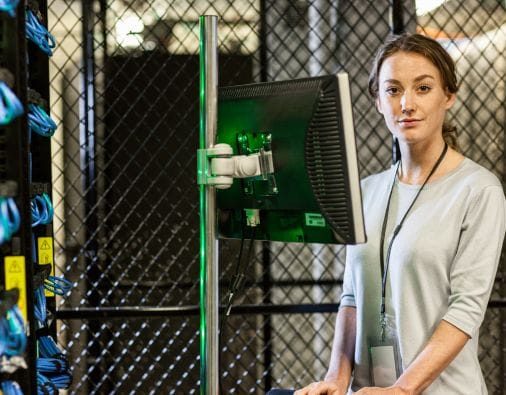Virtual Servers
- Home
- Virtual Servers
Flexible Linux VPS hosting solutions for your business

Can’t find a suitable server size? Get in touch with our support team for tailored solutions.

We run all our servers exclusively on fast SSDs that are deployed on Intel processors.

Your data security is our top priority. We use redundant storage to keep your data safe.

Our Linux VPS plans offer unrivalled hosting at affordable prices. This speedy hosting solution is self-managed, making it ideal for IT professionals and devs looking to break away from shared hosting. You’re also able to customise your package to suit your current goals and scale it up whenever you need more resources.






Scalable Windows VPS hosting for your projects

Our support team is ready to craft custom high-availability Windows Cloud solutions, hosted locally and built for your business or development needs in Africa.

Our infrastructure is proudly hosted in Africa, offering ultra-low latency, local currency billing, and better compliance for businesses.

We prioritize your data security with RAIDz2 redundancy, continuous patching, and locally managed data centers, giving you peace of mind and full control over your environment.

Our Windows VPS plans offer high performance at affordable prices. This popular, simple and scalable solution is self-managed, making it ideal for a range of cloud hosting business needs. Grow as you go – High performance with upgradable resources.






Quick Questions
VPS stands for virtual private server. Physical servers are used to store enormous amounts of data for large businesses, run applications, and connect resources to the internet. Now most businesses and individuals need these functionalities too, but on a much smaller scale. This is where VPS comes in. The physical server is divided into smaller virtual servers that are more affordable so it’s accessible to everyone, not just big companies.
VM stands for virtual machine, whereas KVM stands for kernel-based virtual machine. The two terms represent linked, but different technologies. A virtual machine is a software version of a computer that runs atop a physical computer or server.
KVM is a Linux virtualization solution that lets you create and manage virtual machines on a physical computer or server. So, KVM is used to create VMs. Think of it as the emulation software that makes it possible to run multiple self-contained, isolated operating systems, on the same piece of hardware.
It all depends on the resources you require for your operation. A small business may not need to buy the same package as a bigger business. It’s worth noting that many of the web applications and scripts require a fair amount of memory.
If you’re running an operation that requires the best CPU and RAM for weightless use of your applications, you’ll want to choose a package with more resources. If you’re just starting out a more affordable package will suit you best.
Customer support needs to be exemplary: You can’t compromise on customer support, and neither do we. Our customer support team consists of highly trained, friendly professionals, who are at your disposal. Our turnaround times are unmatched.
Choose KVM virtualization: For many years, KVM has been the model of choice when it comes to virtualization. It guarantees high speed, availability, and security. This is why we use it to run our servers.
If you’re wondering which operating system best suits your needs, choose an OS with which you (and your colleagues) feel comfortable. We support CentOS, Debian, Ubuntu, FreePBX, 3CX, and Windows. We also allow custom mounted ISOs, but we don’t provide support for issues related to these OSs.
Currently you can choose between the following Linux versions: CentOS 8, 7; Debian 10, 9.0, 8.0; Ubuntu 20.04, 18.04, 16.04; FreePBX 10, SNG7; 3CX.
Other Versions are available on request, however, custom mounted ISOs are not officially supported by us, we will not provide support for any custom OS related issues.
It all depends on the package you decide to rent. A more affordable package will have less CPUs. Our packages range from two vCPUs to 16 vCPUs. A vCPU is a Virtual Processing Unit. One or more vCPUs are assigned to a VM. Each vCPU is seen as a single physical CPU core by your server’s operating system.
Larger packages naturally include more vCPU’s, however, the CPU is very often not a limiting factor. In the majority of use cases, the most important factor is how much memory (RAM) is needed. Modern PHP/MySQL scripts often use a lot of RAM, so RAM is very important when deciding which package you buy.
You can host as many websites as you like on your server, we do not define any limit. You just have to ensure the size of your machine is always sufficient for the number of resources your sites use. Your package can be upgraded or downgraded at any time to suit the number of sites you intend to host.
Each server is deployed with 1 IP address to start with. You can request additional IP’s from us in case you need it. In such a case we charge a small monthly amount in addition.
Linux hosting runs some Linux-based operating systems, like Ubuntu, Debian etc. Windows hosting runs Windows Server.
Windows Server is much easier to use, as it can be easily configured from the GUI. With Linux, you need to use the terminal, most of the time.
Windows hosting can run ASP.NET websites and applications, accounting software, etc; Linux can’t.
Windows programmes can run only on Windows hosting.
Windows server hosting has built-in support for Microsoft Access; Linux doesn’t.
Linux is an open-source operating system, whereas Windows Server is commercial – requiring costly licences. Therefore, Linux is cheaper than Windows.
Linux is a much more lightweight operating system compared to Windows Server, which is more resource intensive.
This depends on a few factors:
What kind of apps you intend on running? Be sure to check the software’s minimum requirements.
What’s the maximum amount of memory you may need during peak hours? How much traffic will you get?
How much storage space do you expect to need?
For example, if you’ve got a small website that doesn’t get a lot of visitors, our W1 package (2 vCores, 4GB ram, 100 GB SSD) will suit you just fine.
However, if your business runs remote work environments shared with 40+ staff members, you should consider the high-end packages, like the W6: 16 cores, 64 GB ram, 500 GB SSD.
If you don’t find a suitable VM size on our website, please contact us so we can offer you a custom solution to your exact requirements.
